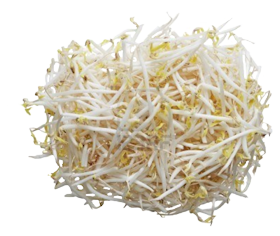|
Bean sprouts are a true concentrate of energy and nutritive principles. Unlike ripe vegetables, whose nutritional value progressively decreases after they have been harvested, bean sprouts retain their nutritional properties until consumed.
Bean sprouts have the richest source of amino acids (for protein), vitamins and minerals, and also contain a good amount of fibre. They contain all types of vitamins (A, B, C, D, E and K), folate and are an excellent source of iron, potassium, calcium, phosphorous, magnesium and zinc.
Other nutritional benefits vary depending on the type of sprout. It is interesting to note that mung bean sprouts contain estrogen-like phytochemicals, called isoflavones, which are responsible for some of the many healthy proprieties of these sprouts.
Anemia: Mung bean sprouts (as well as other types of bean sprouts) are rich in iron, which play a key role in the synthesis of hemoglobin, the protein found in red blood cells. They are also particularly high in vitamin C, which enhances the absorption of iron from the intestine, thereby helping prevent or treat anemia caused by iron deficiency.
Cardiovascular health: When associated with a low intake of saturated fats (found in meat, poultry and dairy products), the regular consumption of mung bean sprouts can help reduce the blood levels of LDL-cholesterol due to its content in fiber and lecithin. This effect is beneficial to the heart and vessels, since it helps prevent the development of atherosclerosis, the most common cause of cardiovascular disease.
Constipation: Due to their high content in fiber, mung bean sprouts can help improve intestinal motility and relieve the signs of constipation.
Hair and nail fragility: Hair and nail fragility is often the result of certain nutritional deficiencies, especially proteins, vitamins and zinc. Mung bean sprouts contain high amounts of all these nutrients in a readily available form, and hence they are particularly helpful in preventing and treating hair and nail problems.
Liver health: Mung bean sprouts are an excellent source of lecithin which, besides lowering blood cholesterol levels, helps reduce liver fat, thereby preventing fatty liver, a common liver condition that can result in liver dysfunction.
Menopause: Mung bean sprouts are rich in phytoestrogens, which have a weak estrogen-like activity. That’s why they can help relieve many symptoms associated with menopause (such as hot flashes and heart palpitations), which are the result of decreased estrogen levels. Phytoestrogens found in mung bean sprouts are also effective in counteracting menopause-related osteoporosis.
Skin anti-aging effect: It has been shown that phytoestrogens found in mung bean sprouts act on certain estrogen-receptors found in the skin, stimulating the synthesis of hyaluronic acid, collagen and elastin, which are vital components of the skin’s structure. Therefore, the regular consumption of mung bean sprouts can help prevent many age-related skin changes, including elasticity and moisture loss.
Stress and tiredness: Mung bean sprouts are a source of readily available energy and other nutrients which are particularly helpful in fighting the signs and symptoms of mental and physical stress and tiredness.
|

